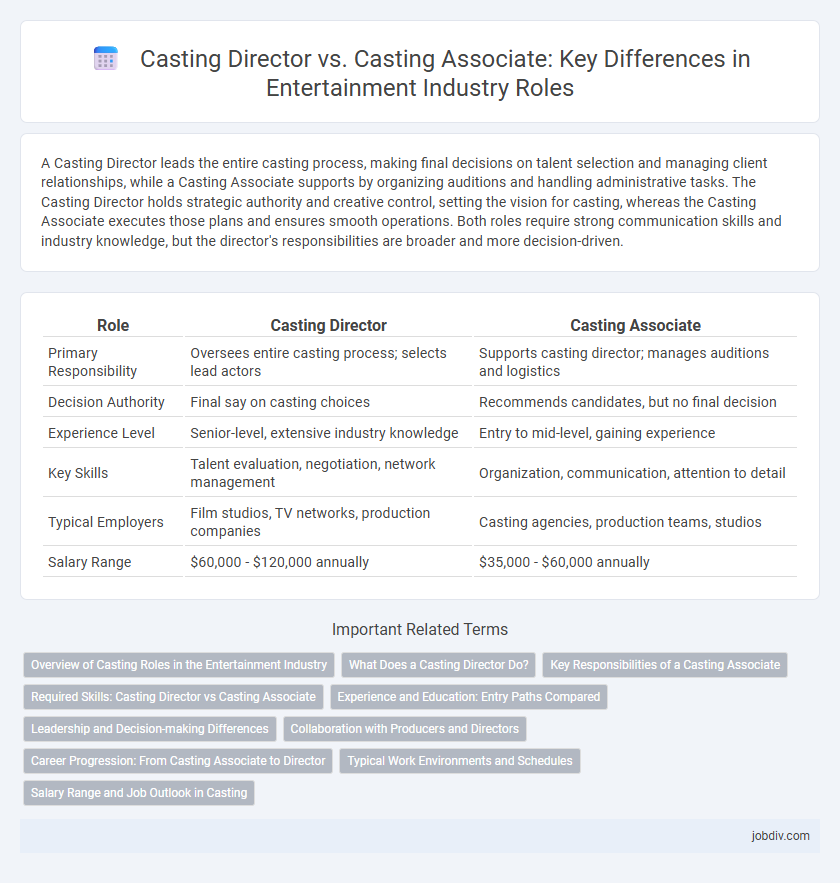A Casting Director leads the entire casting process, making final decisions on talent selection and managing client relationships, while a Casting Associate supports by organizing auditions and handling administrative tasks. The Casting Director holds strategic authority and creative control, setting the vision for casting, whereas the Casting Associate executes those plans and ensures smooth operations. Both roles require strong communication skills and industry knowledge, but the director's responsibilities are broader and more decision-driven.
Table of Comparison
| Role | Casting Director | Casting Associate |
|---|---|---|
| Primary Responsibility | Oversees entire casting process; selects lead actors | Supports casting director; manages auditions and logistics |
| Decision Authority | Final say on casting choices | Recommends candidates, but no final decision |
| Experience Level | Senior-level, extensive industry knowledge | Entry to mid-level, gaining experience |
| Key Skills | Talent evaluation, negotiation, network management | Organization, communication, attention to detail |
| Typical Employers | Film studios, TV networks, production companies | Casting agencies, production teams, studios |
| Salary Range | $60,000 - $120,000 annually | $35,000 - $60,000 annually |
Overview of Casting Roles in the Entertainment Industry
Casting directors oversee the entire casting process, managing talent selection and collaborating closely with producers and directors to find the ideal actors for each role. Casting associates support casting directors by organizing auditions, managing communications with agents, and coordinating schedules to ensure a smooth and efficient casting workflow. Both roles are essential in securing the right talent, with casting directors making final decisions and casting associates facilitating the logistical and administrative aspects of casting in film, television, and theater productions.
What Does a Casting Director Do?
A Casting Director leads the entire casting process by collaborating with producers, directors, and agents to select suitable actors for film, television, or theater projects. They analyze scripts, create casting calls, and conduct auditions to find talent that aligns with the creative vision and production needs. Their expertise directly influences the quality and success of a production by securing the right performers for each role.
Key Responsibilities of a Casting Associate
Casting Associates support Casting Directors by managing administrative tasks and coordinating communication between talent agents and production teams. They organize casting schedules, prepare audition materials, and assist in reviewing actor submissions to streamline the casting process. Their role ensures smooth logistics and efficient information flow, allowing Casting Directors to focus on talent evaluation and final decisions.
Required Skills: Casting Director vs Casting Associate
Casting Directors require advanced leadership abilities, deep industry knowledge, and strong decision-making skills to oversee the entire casting process and manage client relationships. Casting Associates need excellent organizational skills, attention to detail, and proficiency in communication to support Casting Directors with research, scheduling, and coordination tasks. Both roles benefit from a keen eye for talent and familiarity with casting software, but the Casting Director holds greater strategic and managerial responsibilities.
Experience and Education: Entry Paths Compared
Casting Directors typically have extensive industry experience and often hold advanced degrees or specialized training in theater, film, or arts management, starting their careers through internships or assistant roles within casting departments. Casting Associates generally begin with a background in performing arts or communications, gaining entry via internships or junior positions, focusing on building practical skills and industry connections. Experience plays a crucial role for Casting Directors, while Casting Associates rely more on formal education coupled with hands-on learning to advance.
Leadership and Decision-making Differences
Casting Directors hold primary leadership responsibilities, overseeing the entire casting process and making final decisions on talent selection to shape the project's creative vision. Casting Associates support this leadership by managing schedules, coordinating auditions, and providing critical recommendations based on director and producer feedback. While Casting Directors wield authoritative decision-making power, Casting Associates contribute through detailed organization and collaborative input, ensuring efficient execution of casting strategies.
Collaboration with Producers and Directors
Casting directors lead the selection process by collaborating closely with producers and directors to align talent choices with the project's vision and budget. Casting associates support this collaboration by coordinating schedules, managing communications, and preparing detailed breakdowns to ensure smooth operations between all parties. Their combined efforts streamline decision-making, ensuring the best performers are matched to roles effectively and efficiently.
Career Progression: From Casting Associate to Director
Casting Associates play a crucial role in supporting the casting process by coordinating auditions, managing schedules, and liaising with talent agencies. Career progression from Casting Associate to Casting Director involves gaining extensive industry experience, building strong professional networks, and developing keen talent evaluation skills. Successful transition requires mastering project management and artistic vision to lead casting decisions on major film, television, or theater productions.
Typical Work Environments and Schedules
Casting Directors typically work in fast-paced entertainment hubs like Los Angeles, New York City, and London, often managing varied schedules that extend beyond standard office hours due to auditions and industry events. Casting Associates usually support Casting Directors within agency offices, production companies, or studios, maintaining more regular business hours but occasionally accommodating evening or weekend casting sessions. Both roles demand flexibility, though Casting Directors face greater variability due to their leadership responsibilities and client interactions.
Salary Range and Job Outlook in Casting
Casting directors typically earn between $50,000 and $120,000 annually, reflecting their leadership role in selecting talent for film, television, and theater productions. Casting associates, who support casting directors by organizing auditions and managing talent databases, usually earn between $30,000 and $60,000 per year. The job outlook for both positions is positive, driven by the growth of streaming platforms and increased content production, which boost demand for skilled casting professionals.
Casting Director vs Casting Associate Infographic

 jobdiv.com
jobdiv.com